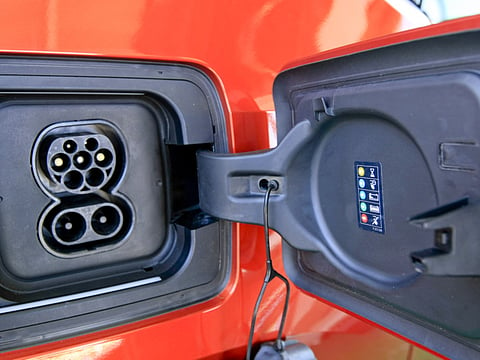Charging up on Dubai-Abu Dhabi highway
Car dealers, DEWA in talks for multiple quick charging points to reduce ‘range anxiety’

Dubai: Dealerships in Dubai are in talks with DEWA (Dubai Electricity & Water Authority) to set up electric car charging lines on the Dubai-Abu Dhabi highway. Multiple access points on that 180-kilometre stretch can go some way to reducing any “range anxiety” issues vehicle owners may have.
“We want to set up one such line - and we are willing to provide DEWA all the equipment to enable a quick 10-15 minute charging for users,” said K. Rajaram, CEO of Al Nabooda Automobiles, the Dubai dealer for Porsche, Audi and Volkswagen. “All that DEWA has asked in return is everything that’s provided should have multi-charging capability; it should not be for any single vehicle brand.
“We are working to get the necessary sign-offs from the authorities.” (Existing petrol stations too will be kitted up to have charging units.)
Dewa’s been busy
The local utility provider has been adding “green charger” points in the city, now totalling more than 200. (Users need to get themselves a Green Charger card by registering with DEWA.) At the government level and at dealerships, new investments are going into these charging points. Al Nabooda is installing them at its showrooms and service facilities ahead of the launches of the Audi e-tron and Porsche Taycan. (Ex-showroom prices for both in the UAE have not been fixed as yet, Rajaram added.) “Infrastructure needs to be built in advance to support electric cars,” said Rajaram. “It will define how comfortable people are in buying these vehicles.”
Currently, full-electric cars make up less than 2 per cent of total new car sales. It is mostly government and fleet sales that contribute to the total, and the rest are mostly made up of ardent Tesla buyers. In recent months, a handful of other manufacturers too have made tentative attempts with their own models. But many still prefer to play the hybrid card rather than go all-electric.
That could, however, be up for a change.
Enter the Kona
The Hyundai dealership, Juma Al Majid Est., is also doing the same ahead of the first quarter 2020 launch of the all-electric version of the Kona subcompact (voted the North American utility vehicle of the year) with a range of more than 400 kilometres.
“It’s a fact that dealers and car manufacturers alike have to do much more in raising awareness about electric cars among users in the UAE and Gulf,” said Suliman Alzaben, General Manager. “Perceptions need to change or better managed.”
Prices still pinch
For now, being passionate about electric cars and owning one are two different things altogether. Sticker prices are still in the Dh100,000 plus - and the emphasis is very much on the “plus” - range, and that immediately pushes it way beyond the budget conscious owner’s aspirations.
So, what would make electric all-acceptable? “Anything Dh60,000 or lower - that would be the only way,” said Alzaben. “But for that technology needs to advance, battery costs need to come down significantly.
“Until such time, it will be the UAE Government that will drive electric car volumes.”
Taxi operators, for instance, now have 10 per cent of their fleets running electric/hybrid and the aim is to take it to 50 per cent by 2025. (Check out all the Tesla Model 3s that will line up in these fleets.)
Real estate is an issue
But there is another factor that could get in the way of wider acceptance - the real estate canvas in Dubai.
“It’s going to be difficult to retro-fit charging lines at all those towers already built,” said Rajaram.”That’s why New York is yet to take electric vehicles in the same way that California with all its standalone homes has.
“Sure, developers in Dubai can still have their overnight charging bays in new towers - but the question is what can be done at the older ones?”
Governments must drive electric vehicle show
In any market where electric cars have found a footing, governments there would already have done the hard work through offering tax breaks and a multitude of other incentives. This way, buyers would be reasonably assured the higher costs they pay for the car would be compensated elsewhere. Or at least a good portion of it. Much the same would need to happen in the UAE and Gulf markets if electric cars are to get the consumer push. “It’s clear that governments will come up with more legislations to clean up the environment,” said Karl Hamer, CEO of Adamas, the local Lotus dealership. “Car companies and governments can come together to do the same for electric vehicles.” Electric car sales make up about 2 per cent of the overall automotive market in the UAE, with the government focussing on building up their numbers in government and taxi fleets. On the incentive side, the authorities have been rolling out a few, such as free parking. “Making electric car prices more affordable could only be a year or two away - every day brings out new announcements in the industry about making cheaper batteries,” said Hamer. “Once that’s achieved, the process will start to adjust on their own.”



